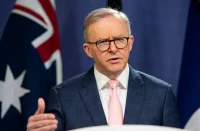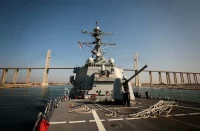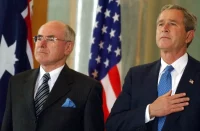After Syrian security forces liberated first the area west of Homs and then the area northwest of Idlib, it became obvious that now only a foreign invasion can overthrow President Bashar al-Assad. And Damascus is doing its best to exploit its advantage as quickly as possible: It got a new constitution approved by referendum, proclaimed a national unity government and scheduled parliamentary elections for May 7.
Both the West and the Arab League have begun stepping more cautiously around Syria. It is difficult otherwise to find an explanation for how Foreign Minister Sergei Lavrov was able to come to agreement on basic principles for resolving the Syrian crisis with his counterparts from the Arab League at a March 10 meeting in Cairo: an end to violence by all parties, an impartial monitoring mechanism, no foreign intervention, unhindered access for humanitarian assistance to all Syrians, and support for UN-Arab League Special Envoy Kofi Annan’s mediation mission.
The West is somewhat hopeful that his mission will succeed, but it is not truly helping to bring about a political dialogue between the government and the opposition. Meanwhile, it is looking at providing humanitarian assistance to the opposition and supplying it with means of communications, and it is pressuring Baghdad to prevent weapons for the Syrian government from going through Iraqi territory.
The views of the Persian Gulf states towards Damascus are the most radical. Qatar believes that foreign forces, primarily Arab, are needed to resolve Syria’s domestic conflict. Given what happened with Libya, that probably means a military operation by NATO countries that simulates Qatari and United Arab Emirates involvement. In reality, however, the only member of the North Atlantic Treaty Organization that may decide to use military force is Turkey. But Ankara is not ready for a full-scale war. Turkey would would be fine with seizing areas of Syria on its northern border to create a so-called “buffer zone” where the Free Syrian Army could marshal its forces for a march on Damascus. One reason for that is the support Syria’s leaders are currently giving the Kurdistan Workers’ Party (PKK) in Turkey.
It should be noted that since 1980 Syria has not only given PKK members political asylum, it has also assisted them to the point that the Turks found it necessary to mine the entire 900-kilometer border with its southern neighbor (the emplacement of 700,000 antipersonnel mines indicates the scale of the effort). It was apparently the Soviet Union that brought Syria and the PKK together. The following factors contributed to that: territorial claims on the Sandjak of Alexandretta (now the Turkish Hatay region), competition with Turkey for regional leadership, and a significant reduction in the discharge of the Euphrates River after the construction of hydropower and irrigation projects in South-Eastern Anatolia during the 1970s and 1980s.
That moved Turkey and Syria to the brink of war in the fall of 1998. It was only thanks to the shuttle diplomacy of Egyptian President Hosni Mubarak and Iranian Foreign Minister Kamal Kharrazi that an armed conflict was avoided. The Jeikhan Agreement was signed in October of that year. Under that agreement, Kurdistan Workers’ Party leader Abdullah Öcalan was forced to leave Syria, PKK military camps were banned from Syrian territory, and some members of the organization were arrested.
Syrian-Turkish cooperation was further strengthened by the rise to power of Bashar al-Assad, who began pursuing pragmatic domestic and foreign policies, as well as by the establishment of a de facto independent Iraqi Kurdistan. That made possible the first ever official visit by a Syrian president to Ankara in January 2004 and the signing of bilateral free trade and water sharing agreements, and it made it possible for Turkey to mediate the return of the Golan Heights, which Israel had occupied in 1967.
The situation changed again in 2009, when Turkey began more confidently asserting its regional leadership amidst the Arab Spring. It took part in the overthrow of Libya’s Moammar Gadhafi, although it limited its actions to assisting the naval blockade. Ankara significantly downgraded its relations with Tel Aviv over Israel’s refusal to formally apologize for the deaths of Turkish members of the Freedom Flotilla that tried to deliver humanitarian aid to the Gaza Strip in May 2010 despite repeated warnings from Tel Aviv. Turkey and several Western states believe members of the Israeli military overreacted.
Under Ankara’s foreign policy, it has essentially begun interfering in Syria’s internal affairs by establishing logistics bases for the Free Syrian Army on its own territory and forming the Syrian National Council with the assistance of Western countries. Moreover, according to some reports, more than 70 Turkish officers have been captured in Syria. It is from here that attempts are being made to smuggle weapons and infiltrate radical Syrian opposition groups. Turkey is willing to establish a “humanitarian” aid corridor allegedly to expand these activities.
I should point out that the Syrian leadership has found it necessary to cooperate with followers of the Kurdistan Workers’ Party. First of all, the Kurds control much of the arms smuggling from Turkey to Syria. Second, given the unstable domestic situation (which is on the verge of civil war), Damascus cannot ensure the security of areas with a heavy Kurdish population. That is taken care of by 2000 Kurds. Third, the strong, sometimes excessive, Turkish pressure on President Assad is forcing him to play the so-called “Kurdish card.” As a result, Syrian Kurds have for the first time received considerable autonomy, including the right to open their own schools.
The Kurdish factor, the desire to lead and expand Turkey’s sphere of influence in the Middle East and continuing US influence will prod the Turkish government to put troops on Syrian territory.
However, there are factors that will work to counter that, including Ankara’s reluctance to damage its relations with Moscow. We saw evidence of that last month in Prime Minister Recep Tayyip Erdoğan’s telephone call to Russian President Dmitry Medvedev. During that conversation, both countries displayed a willingness to coordinate actions in the interest of expeditiously ending the Syrian crisis by peaceful means. Since then, the tone of statements by the Turkish leadership regarding Damascus and President Assad has been significantly less harsh. It is also noteworthy that the statements are unfailingly accompanied by remarks that the use of force to resolve the problem is unacceptable.
Turkey’s main opposition parties, the Republican People’s Party (CHP) and Nationalist Movement Party, hold a similar points of view. They believe that what is happening in Syria is the internal affair of that country. For example, according to Faruk Loğoğlu, a CHP leader, nothing, not even humanitarian aid, can legitimize Ankara’s intervention in the affairs of neighboring states. He condemned US attempts to push his country into a war with Syria that “will put Turkey in a difficult position.”
This is what members of the Turkish opposition believe: Any intervention by Turkey in Syrian affairs will make the situation worse, disrupt the regional balance of power, cause countries friendly to Syria to reciprocate, and form the basis for long-term hostility towards Ankara by the entire Arab world. That opinion needs to be heeded. A statement by Foreign Minister Ahmet Davutoğlu saying Turkey would give the Syrian opposition no material or military support confirms that. However, the amount of assistance provided through informal channels is only increasing.
The political risks for Turkey’s current leaders are quite high should there be an armed conflict with Syria. Numerous officer purges to remove the military from the real levers of power have seriously weakened the national armed forces. The Syrian army as a whole remains loyal to the current government, and should there be a foreign invasion the opposition could not provide much assistance for fear of being accused of betraying national interests. Worse yet, part of the opposition together with the Kurds would resist the Turkish Army with force.
Turkey’s Kurdish problem would evidently be exacerbated. Syrian intelligence would become more active, and the Alawites would intensify their anti-government activities. According to some estimates, Turkey has between 10 and 15 million Alawites. The country’s economic situation would worsen due to, for example, a significant drop in tourism (in 2011, 36 million tourists from Germany, Russia, the United States, Italy and France visited Turkey, contributing $23 billion to the nation’s budget).
Turkey stands to lose a great deal if the amount of oil and natural gas transiting Turkey on its way to Europe drops sharply (which could very well happen if there is a war). The country’s foreign policy isolation could increase, complicating bilateral relations with Russia, Iran and several other states. All of this taken together could result in a serious crisis of government and bring opposition parties to power. It is a very realistic scenario and one that requires the government to step very carefully in its actions towards Syria.
____________________________________
Vladimir Evseev is the Director of the Russian Center for Social and Political Studies.
Source: New Eastern Outlook














Turkey has become some sort of uncomfortable enigma and its ambiguity in foreign affairs all the more baffling. Until quite recently Ahmet Davutoğlu`s philosophy of international affairs was a radiant zero-problem strategy with the country`s neighbors. Some sort of Turkish Foreign Affairs philosophy was in the making and during the Egyptian revolution the Turkish model was proposed to be taken as The example to be followed.
But then something new took shape, a change of course as it were, and then came Lybia and after Lybia the first signs of disturbances in Syria.
Still in the very beginning of manifestations in Syria we were told that Davutoglu was advising Bashar Assad to proceed quickly to basic reforms before anything worse could take form. And then, the turmoil came and now all this string of embarrassing events and revelations. Was it all double-track from the very beginning alongside with a hidden agenda, or just a powerful carried-away-with change of course due to formidable imposing forces majeurs? The answer to this question would explain so many things retrospectively as well as prospectively.
This report is actually a highly insightful analytical summation of the Syrian conflict to date. It underscores the importance of Turkey’s own domestic opposition who point to the danger of ‘informal channels of foreign assistance’ to the so-called Syrian Opposition, ‘channels which are only increasing’. We no longer need anticipate a great moral hope from Prime Minister Erdoğan’s Turkish model. It’s the Syrian leader, Bashar al-Assad, who shines the region’s exemplary statesman. But Empire vampires are rabid for his blood.